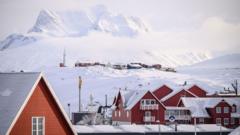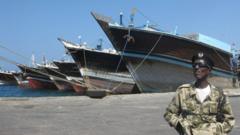The visit is viewed as a diplomatic maneuver, eliciting mixed reactions regarding US intentions in Greenland's political landscape.
US Vice President Visits Greenland Amid Tensions and Cultural Discontent

US Vice President Visits Greenland Amid Tensions and Cultural Discontent
Delegation's trip reflects geopolitical interest and local disapproval in the context of US plans for the region.
In a noteworthy visit scheduled for Friday, a high-profile delegation of US officials, including Vice President JD Vance and National Security Advisor Michael Waltz, is set to arrive at a remote military base in Greenland. The visit, while officially framed as a cultural interaction, is perceived by many in Greenland and Denmark as part of America's broader strategy concerning the semi-autonomous Danish territory, which has recently drawn significant attention, particularly following President Donald Trump's expressed interest in acquiring it due to its mineral resources and strategic importance.
Originally, Usha Vance, the vice president’s wife, had planned to visit Greenland for a cultural event with her son, highlighting the local traditions, unveiling the annual dog-sledding race, and engaging with the Greenlandic community. However, the nature of the visit shifted dramatically after the announcement that national security advisor Waltz would also accompany the delegation. This change incited unease among Greenlanders and Danish officials alike, as suspicions regarding the US's intentions grew, hinting at possible interference in local governance and sovereignty.
Greenland's Acting Prime Minister, Mute B. Egede, publicly condemned the visit as a "provocation" while asserting that the Greenlandic government had not extended any invitation for the official visit. Local residents expressed discontent, articulating that the American delegation might not receive a cordial response upon their arrival, signaling a clear aversion towards perceived American encroachment on Greenland's autonomy.
In Sisimiut, the location of the dog-sled event, the mayor opted out of meeting Usha Vance, citing upcoming municipal elections as a reason. There were also plans for a silent protest, highlighting the community's unwillingness to embrace American officials, which threatened to create an embarrassing situation for the vice president’s entourage. Analysts, anticipating a public relations misstep, remarked that the trip was initially aimed at a charm offensive that lacked genuine connection with the people of Greenland.
In response to the backlash, the visit was markedly scaled down, with plans now limited to a tour of the Pituffik Space Base, a crucial site for US missile defense. This pivot seemingly reflects a strategic recalibration amidst rising tensions, with political leaders in Denmark interpreting this step as "masterful spin" rather than escalation. Danish Foreign Minister Lars Lokke Rasmussen expressed that sticking to a visit to the military base is a welcome restraint.
Despite the changes in the delegation's itinerary, JD Vance underscored the importance of engaging with Greenland, arguing that previous neglect had negative consequences not just for Greenland, but for broader global security dynamics. However, while officials in Denmark may find some solace in a less confrontational program, underlying concerns about America’s growing interest in Greenland remain prevalent. Political analysts suggest that this visit marks the beginning of a complex geopolitical recalibration concerning the Arctic, emphasizing US strategies aimed at enhancing its military presence and influence in the region amid increasing competition from global powers like Russia and China.
The implications of Vance's visit and the overarching US strategies towards Greenland raise questions about future relations and the balance of sovereignty as regional dynamics evolve within the context of American interests. As dialogues unfold, this scenario underscores an ongoing scrutiny of the intricate interplay between nation-states and the sometimes contentious nature of their interactions with smaller entities on the global stage.
Originally, Usha Vance, the vice president’s wife, had planned to visit Greenland for a cultural event with her son, highlighting the local traditions, unveiling the annual dog-sledding race, and engaging with the Greenlandic community. However, the nature of the visit shifted dramatically after the announcement that national security advisor Waltz would also accompany the delegation. This change incited unease among Greenlanders and Danish officials alike, as suspicions regarding the US's intentions grew, hinting at possible interference in local governance and sovereignty.
Greenland's Acting Prime Minister, Mute B. Egede, publicly condemned the visit as a "provocation" while asserting that the Greenlandic government had not extended any invitation for the official visit. Local residents expressed discontent, articulating that the American delegation might not receive a cordial response upon their arrival, signaling a clear aversion towards perceived American encroachment on Greenland's autonomy.
In Sisimiut, the location of the dog-sled event, the mayor opted out of meeting Usha Vance, citing upcoming municipal elections as a reason. There were also plans for a silent protest, highlighting the community's unwillingness to embrace American officials, which threatened to create an embarrassing situation for the vice president’s entourage. Analysts, anticipating a public relations misstep, remarked that the trip was initially aimed at a charm offensive that lacked genuine connection with the people of Greenland.
In response to the backlash, the visit was markedly scaled down, with plans now limited to a tour of the Pituffik Space Base, a crucial site for US missile defense. This pivot seemingly reflects a strategic recalibration amidst rising tensions, with political leaders in Denmark interpreting this step as "masterful spin" rather than escalation. Danish Foreign Minister Lars Lokke Rasmussen expressed that sticking to a visit to the military base is a welcome restraint.
Despite the changes in the delegation's itinerary, JD Vance underscored the importance of engaging with Greenland, arguing that previous neglect had negative consequences not just for Greenland, but for broader global security dynamics. However, while officials in Denmark may find some solace in a less confrontational program, underlying concerns about America’s growing interest in Greenland remain prevalent. Political analysts suggest that this visit marks the beginning of a complex geopolitical recalibration concerning the Arctic, emphasizing US strategies aimed at enhancing its military presence and influence in the region amid increasing competition from global powers like Russia and China.
The implications of Vance's visit and the overarching US strategies towards Greenland raise questions about future relations and the balance of sovereignty as regional dynamics evolve within the context of American interests. As dialogues unfold, this scenario underscores an ongoing scrutiny of the intricate interplay between nation-states and the sometimes contentious nature of their interactions with smaller entities on the global stage.





















